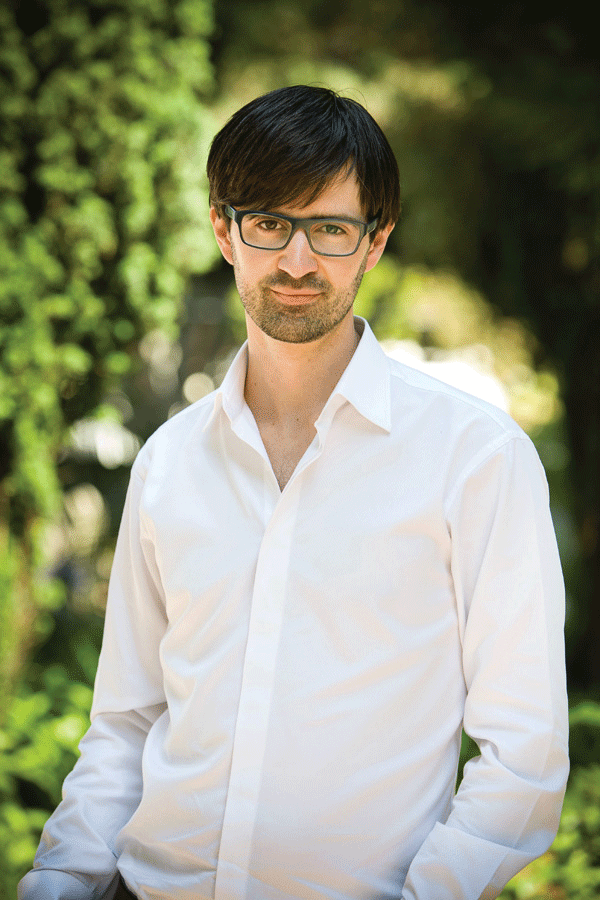Johnson Lectures on Putting Poverty First
Journalist and author Nathanael Johnson, pictured above, lectured on the topic of putting poverty first in solving environmental issues.
On Monday, September 18, guest speaker Nathanael Johnson led the lecture “What if We Put Poverty First?” in Love Auditorium in Olin Hall. The lecture was sponsored by the Environmental Studies Department, Geography Department, Peace and Conflict Studies Department, and the Sociology and Anthropology Departments.
Johnson is an award-winning journalist and the author of two books, All Natural and Unseen City. He is also a senior writer for Grist, a nonprofit online magazine that focuses on environmental news and social commentary. Additionally, Johnson has written features for Harper’s Magazine, Outside magazine, National Public Radio (NPR) and This American Life.
From a young age, Johnson was struck with the question of how to save the planet. His early memories help illuminate how he’s come to his argument today. To illustrate this point, Johnson put up photographs from his childhood to demonstrate the values and perspective he was brought up with.
One of the photos was of him as a young child with his father on a hiking trip. Johnson explained that at this early point in his life, he came to realize that the farther away he got from civilization, the more beautiful the world became. This is how he arrived at his first argument: humans are the bad guys. They carve up and diminish the wonders of nature into ugly and dull concrete structures.
“The capital engine has completely despoiled the planet,” Johnson said.
However, he then realized that humans can have positive impacts on the planet. But Johnson believes that redistribution of wealth is not politically feasible and not an attractive solution, even to a liberal environmentalist.
“If growth runs off fossil fuels and huge swaths of forest, how can humanity experience growth without disrupting the environment at an alarming rate?” Johnson asked.
Johnson answered this by explaining that the human race must continue to innovate out of constraints, referencing the book, The Big Ratchet by Ruth DeFries, which explores how humanity has thrived in the face of natural crisis. He explained that the more comfortable people get, the more risk averse they become. Thus, the better the lifestyle, the less inclined people are to changing their lifestyles.
However, while attempting to tackle the question of how to save the world, Johnson found that writing for Grist has unexpectedly made him hopeful about the future. He believes that asking the question, “How do we tackle poverty without wrecking the planet?” is a starting point for coming up with a solution.
Johnson pointed out that the answers have a lot to do with agriculture. He took deforestation as an example – it mostly occurs in poorer countries where inhabitants are mostly powerless to protect the land around them. The exploitation of resources happens because wealthy countries can afford to outsource and extract on an unsustainable and mass scale.
Johnson argues that increasing the quality of life in poor countries would prevent activities like rapid deforestation because its inhabitants would be better positioned to control and protect their own lands.
Johnson acknowledged that there are no perfect solutions. But he has come reluctantly, as an environmentalist, to embrace growth and prosperity instead of conservation. Johnson conveyed what it means to be a “dynamist” in regards to this topic – someone who embraces vigorous activity and production within the environment.
Johnson’s argument entails that poor people need change, and since 70 percent of the 700 million people living in extreme poverty across the globe are farmers, this means investment in agriculture. Shifting the focus to advancing the capabilities of small farmers could lead to a ratchet up of innovation, which could in turn result in more sustainable lifestyles across the globe.
First-year Christina Weiler responded to the lecture with a question of her own.
“How do we create demand for small farmers without leaving behind the large corporations? In other words, how do we create a transition for the millions of employees in corporations so we don’t leave them unemployed if the focus shifts to small business?” she asked.
Johnson responded by mentioning that there is a push for big corporations to address forms of sustainability, and that many are beginning to form pacts around it because of increasing consumer demand.
Senior Economics major Gabby Guzman also reflected on the lecture.
“We often hear that we have to choose between the health of the American economy and the environment – for example with President Trump’s decision to pull out of the Paris Climate Agreement. I liked that Johnson proposed a sustainable way to help populations living in poverty,” Guzman said.
Contact Maddie Veronis at [email protected].







